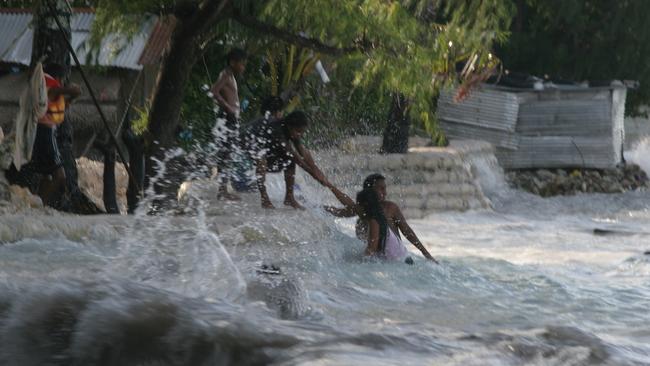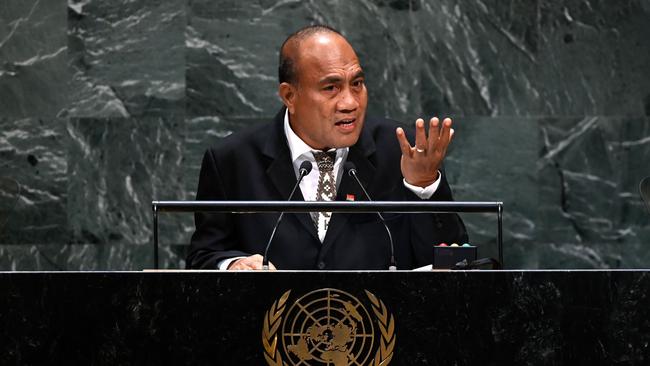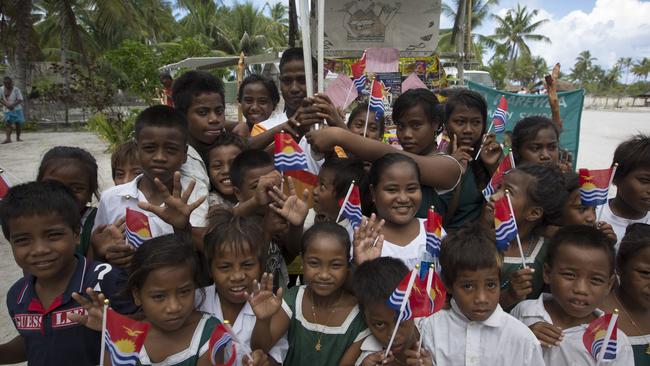UN issues ruling about Pacific climate change refugees
The United Nations has warned the world to prepare for millions of climate change refugees as it ruled countries can no longer force deportation of asylum seekers if their home countries are under environmental threat.
Climate Change
Don't miss out on the headlines from Climate Change. Followed categories will be added to My News.
The United Nations has warned the world to prepare for millions of climate change refugees as it ruled countries can no longer force deportation of asylum seekers or other non-citizens if their home countries are deemed to be under environmental threat.
The respected UN Human Right Committee has put countries like Australia on notice that deportations of citizens back to their Pacific Islands homelands could breach obligations to human rights covenants.
The committee issued a non-binding but usually closely followed ruling after a Kiribati man who migrated to New Zealand in 2007 from his Tarawa Island home in 2015 failed to get asylum and was expelled on the grounds rising sea levels did not threaten his life.
The UN committee upheld the New Zealand Immigration and Protection Tribunal’s decision to deport, agreeing the Kiribati local Ioane Teitiota did not face an immediate danger within the scope of the Refugee Convention.
But it also accepted that rising sea levels were likely to render the Republic of Kiribati uninhabitable, prompting a broader ruling based on the degradation of the environment due to climate change.

The UN High Commissioner for Refugees Filippo Grandi said the ruling had broad implications for governments and a climate emergency had to be viewed like a war and a risk to life.
“We must be prepared for a large surge of people moving against their will,” he said. “I wouldn’t venture to talk about specific numbers, it’s too speculative, but certainly we’re talking about millions here.”
Under Australia’s Migration Act 1958 which codifies Australian international obligations, climate change and environmental issues are not factored. A law change to accommodate the legally non-binding UN ruling is unlikely.
At last year’s Pacific Island forum Prime Minister Scott Morrison was accused of dismissing Pacific neighbours’ concerns about climate change as he sought to water down the wording of a joint communique about the threat.

Acting Immigration Minister Alan Tudge would not discuss the UN ruling directly or its implications for Australia but said Australia had one of the most generous humanitarian programs in the world.
He said current laws were based on race, religion, nationality and membership of a particular social group; environment/climate change was not a humanitarian program focus or obligation.
“A person may also be found to engage Australia’s protection obligations if there is a real risk they will suffer ‘significant harm’ if returned to their home country; significant harm is defined as the arbitrary deprivation of life, the death penalty, torture, cruel or inhuman treatment or punishment, or degrading treatment or punishment.”
Home Affairs Minister Peter Dutton declined to comment saying it was a question only for immigration.

Amnesty International branded the case “groundbreaking” and described the fate of Pacific Islands as the canary in the coal mine warning of climate change.
“The decision sets a global precedent,” Kate Schuetze, Pacific researcher at Amnesty, said.
“The message is clear – Pacific Island states do not need to be under water before triggering human rights obligations to protect the right to life.”
The Refugee Convention was developed after World War 2 to deal with Holocaust victims and mass displacement of peoples.

Prominent Australian human rights lawyer George Newhouse said when that convention was drafted climate change was not an issue.
“The UN is now addressing this gap by sending a message that we need an international framework to urgently respond to the climate crisis that faces nations like Kiribati which could soon be uninhabitable as a consequence of rising sea levels,” he said yesterday.
“We have to ask ourselves as human beings and citizens of the world whether we are prepared to let people drown because we won’t open our doors to climate refugees who, through no fault of their own, need to make a home in another country.”
He said Australia was already seeing a form of climate displacement domestically with some towns potentially becoming uninhabitable and unlikely to ever recover from devastating bushfires.
The Geneva-based UN committee, which monitors states’ compliance with the 1966 International Covenant on Civil and Political Rights, vice chairman Professor Yuval Shany, said there would be future cases where a claim to a right-to-life violation would involve climate change.
“This ruling sets forth new standards that could facilitate the success of future climate change-related asylum claims,” he said.
There are 33 island in Kiribati of which 32 are barely 2m above sea level and has already seen some forced to flee. The Marshall Islands, Tuvalu and the Maldives are also deemed to be most at risk of rising seas but also Fiji, Vanuatu and Solomon Islands.
“Given that the risk of an entire country becoming submerged under water is such an extreme risk, the conditions of life in such a country may become incompatible with the right to life with dignity before the risk is realised,” the UN experts concluded in their 16-page ruling.
“Without robust national and international efforts, the effects of climate change in receiving states may expose individuals to a violation of their rights.”
